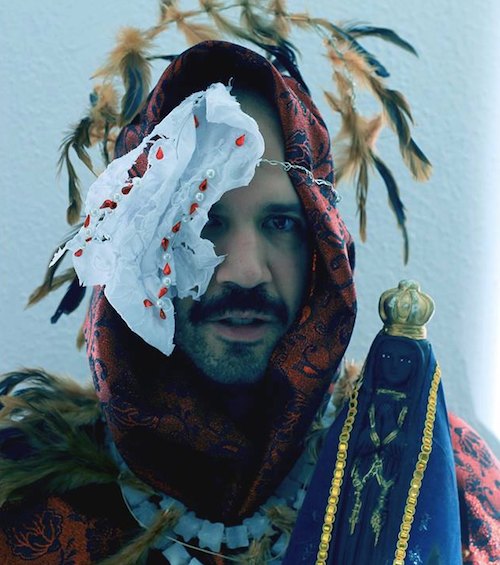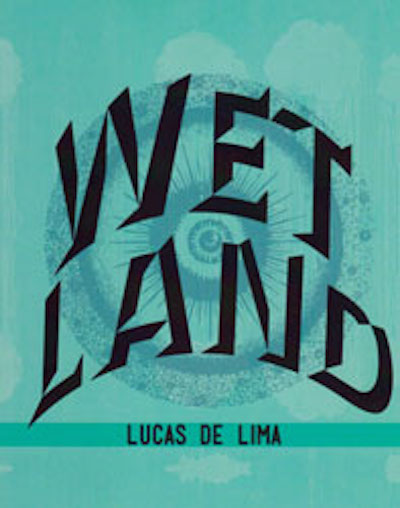'every living cell has consciousness': The Work of Lucas de Lima
BY CAConrad

In April, 2015 Lucas de Lima performed with the poet Hiromi Ito and her translator Jeffery Angles at The Kelly Writers House on the campus of the University of Pennsylvania. They also had a recorded conversation together in the Wexler studio, which you can listen to below. Here are some thoughts adapted from my introduction.
Before Christianity colonized Europe and the Americas, queer people were esteemed for their informed orientation between the gaping maw of gender and sexuality. Queerness was holy, was shamanistic, and the pagan cultures they belonged to—as racially various and spiritually divergent as they were—also shared a deep awareness of the intricate and delicate interdependence between all plants, animals, and minerals.
Christianity’s centuries-old stance of dominion over and disregard for the health of the land and animals for preferring the afterlife of Heaven has cost us dearly. Degraded soil, air, and water combined with the World Wildlife Fund’s “2014 Planet Index Report” which indicates a 52-percent loss of all wild animals in the past three decades has us teetering directly into the sixth mass extinction of Earth.
This is a new, untitled poem by Lucas:
sparks multiplying until they light up
the birth of an eye
pinto’s first spell protrudes from a branch, gleaming
i fear the planet’s crumble
as half man half ant-bird
shells in smithereens
my face enlarged before pinto’s detached artificial pupil
like a sovereign chicken wing, flapping
disembodied at the amazon’s edge
loud laughter coming out of the earth
the haze of our brethren with no
chance of mending sky
contained as a voice inside the wing
i want to live in
the extended, violated curtain of death
i long to wrap myself in
on days i hear our foremothers shout
about the broken light, grand flight
invisible streak
they birth thru us
At the brink of disaster there are artists tuning their senses to our diseased planet as an extension of their own troubled bodies. Lucas de Lima is one such poet who is listening to the planet to listen to his life. His book Wet Land is an organic engine set to recalibrate our tools of awareness before it is too late like a queer pagan witch come to reinvigorate these systems we have long forgotten for our continued survival.
Lucas writes: These poems mythify the alligator attack that killed my dearest friend in 2006. To write this book—to inscribe myself into its bloodstained ecology—I have to become a bird. I transform into the airborne body that shares a dinosaur ancestry with alligators and remains their closest kin. I do this as if the evolution of scales into feathers were an adaptation to grief.

The biologist Lynn Margulis asserts that the neo-Darwinists with their theories of natural selection are wrong, that it is symbiogenesis, or interspecies cooperation that make the largest historical leaps forward in evolution. She is a scientist who has proven that every living cell has consciousness and that it is collaboration between cells that brought us into being and if this can be heeded in time it might keep us alive.
Lucas de Lima transmutes all cells throughout the poems of Wet Land, killing the alligator, killing himself “INTO EVERYONE” he even feels a kinship with the land itself as he writes, “I FEEL CONTIGUOUS WITH THE LANDSCAPE / LIKE ANY FLATTENED BIRD WHO SNEEZES BACK TO LIFE AFTER GETTING RUN / OVER BY A TRUCK.” He is often transgressing the rational for the magical, dreaming together with his friend, unapologetically trusting intuition. Albert Einstein said, "The intuitive mind is a sacred gift and the rational mind is a faithful servant. We have created a society that honors the servant and has forgotten the gift."
Lucas is a poet who actually lives the politics his poems proclaim in his affinity for ACT UP, wanting to KILL the AIDS virus with alligator blood. In public he stands up to the modern day court poets who serve their masters well, but with his fierce defense of his intuitive gift Lucas is a poet who is his own master. It is an incredible honor to be alive on our planet at the same time as this remarkable poet.
Be certain to also check out Lucas’s interview with Thomas Trudgeon.
And his chapbook Terraputa from Birds of Lace. From the book:
it’s ok to be the ghost of a rose permeating the seascape.
the ocean will cream for you when you cannot.
our bodies are alleyways down which you crawl, parading eyeshine & teasing us in Technicolor, your continent tattering our blanket of souls. as we flag encased in glass, we long for your flame to make rags of us.
***
Lucas de Lima was born in southeastern Brazil. He is the author of Wet Land (Action Books) as well as the chapbooks Ghostlines (Radioactive Moat) and Terraputa (Birds of Lace). A contributing writer at Montevidayo, he pursues doctoral studies in Comparative Literature at the University of Pennsylvania.
CAConrad has worked with the ancient technologies of poetry and ritual since 1975. As a young poet, …
Read Full Biography

